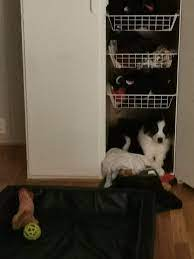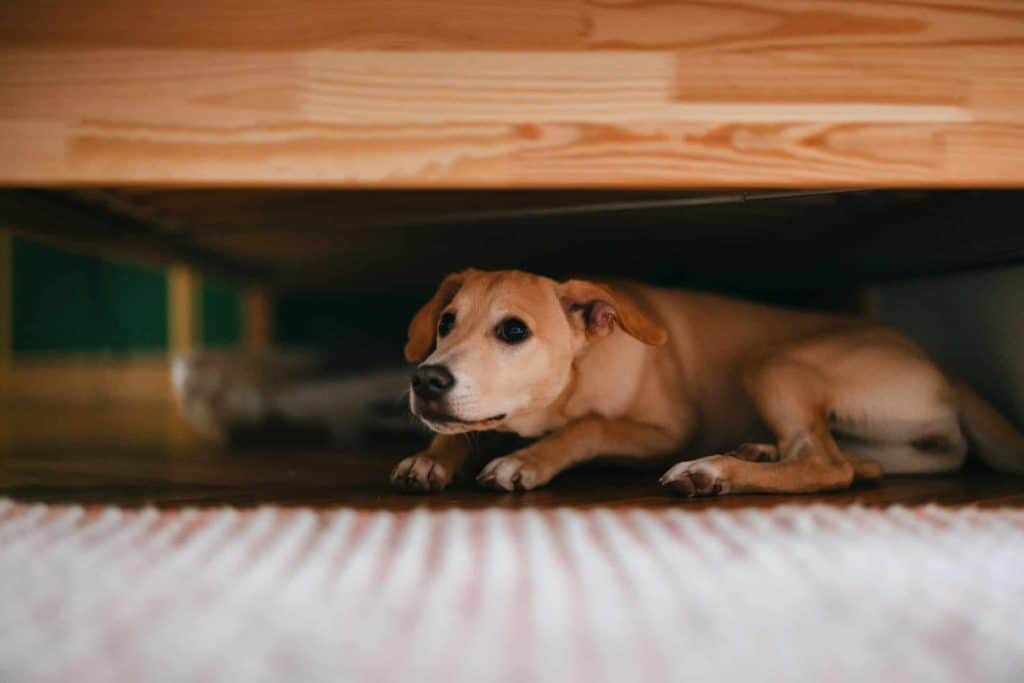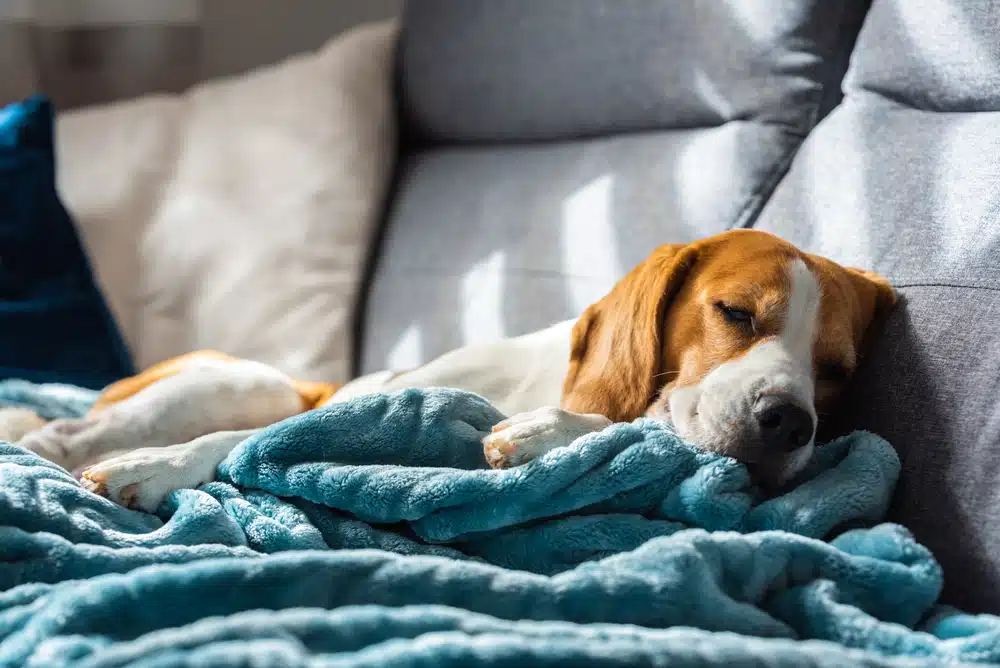Why Does My Dog Sleep in The Closet

Have you ever wondered why your canine companion prefers to curl up in the closet for a nap instead of a cozy dog bed?
The behavior of dogs seeking out confined spaces such as closets is an intriguing aspect of their natural instincts and preferences. Understanding this behavior can provide valuable insights into your dog's comfort and security needs.
Exploring the reasons behind this behavior can shed light on the fascinating world of canine psychology and help strengthen the bond between you and your furry friend.
Let's delve into the possible explanations behind "Why Does My Dog Sleep in The Closet" and unravel the mystery behind this peculiar preference.

Understand the Behavior of Dogs Sleeping in Confined Spaces
The behavior of dogs seeking out small, enclosed spaces to sleep in is not uncommon. In fact, it's a natural instinct that stems from their ancestors' survival instincts. Wild canines and wolves - the predecessors of our domesticated dogs - often seek out dens or burrows to rest and keep warm.
Similarly, your dog may prefer sleeping in a closet, under a bed, or in other small, cozy spots for the same reasons. These spaces provide your dog with a sense of security and comfort, just like dens did for their ancestors. Your furry friend may also feel protected from any potential dangers or threats in these confined spaces.
Moreover, Dogs are sensitive creatures and can feel anxious or overwhelmed by external stimuli, such as loud noises, bright lights, or busy environments. In such situations, they often seek out quiet and dark areas to retreat to and recharge. A closet provides just that - a peaceful haven for your dog to rest and rejuvenate.
Reasons Why Does My Dog Sleep in The Closet
There could be various reasons behind your dog's preference for sleeping in the closet. Many dogs sleeping habits are unique, and their reasons can differ from one canine to another. A dog looks for a safe and secure place to sleep, and that is what a closet provides.
The following are some possible explanations for your pooch's behavior:
Security:
As mentioned earlier, dogs often seek out confined spaces for a sense of security and protection. The closet's walls and the closed door provide a cozy nook where your dog can feel safe and secure from any potential dangers.
Dog's behavior is deeply rooted in their wild ancestors' instincts of finding a secure and enclosed place to rest and recharge, which could be why your dog prefers the closet. Dog loves to sleep in the closet because it provides them with a sense of security and helps them relax.

Familiarity:
Dogs are creatures of habit, and they often form routines and patterns in their daily lives. If your dog has been sleeping in the closet since they were a puppy, it may have become a familiar and comforting space for them.
The familiarity of the closet could be another reason why your furry friend prefers to snooze there. The closet door is closed for some reason, but it is still a secure spot to rest. A dog sleeps in the closet because it provides a sense of home, safety, and comfort.
Doggy Depression: What to Look For
A sudden change in your dog's sleeping habits, such as sleeping more than usual or seeking out new sleeping spots, could be a sign of depression. Dogs can experience depression due to various reasons, including changes in the environment or daily routine. But animal behaviorist suggests one of the reasons for a canine depression could be due to health issues.
If your dog shows any other signs of depression, such as changes in appetite, decreased interest in activities they once enjoyed, or uncharacteristic lethargy, it's essential to consult with a veterinarian. Your furry friend may require medical attention and treatment to alleviate their depression.
Noise Reduction:
Dogs are sensitive to loud and sudden noises. If your home is a busy and noisy environment, your dog may seek out the closet for some peace and quiet. A closed door provides an excellent barrier against external sounds that could be causing stress or anxiety in your canine companion. Positive reinforcement is the key to getting your dog to sleep in its bed instead of the closet. Foot traffic, chatter, and other noises can be overwhelming for a dog that's sound asleep.
If you want your dog to sleep in a designated spot like a soft bed, try making it more appealing by placing toys or treats near it. Over time, your dog will associate the bed with positive experiences and may prefer it over the closet.
Temperature Control:
Dogs have a higher body temperature than humans, which means they can get hot quickly. If your home is on the warmer side, your dog may seek out cooler spots to sleep in. A closet - especially if it's not near any heating vents or direct sunlight - can provide a cool and comfortable place for them to nap.
Dogs sleep in the closet because it's more comfortable for them to maintain a lower body temperature, and they may even prefer it during the hot summer months.

Lack Of Alternative Sleeping Options:
Dog sleeping preferences can change over time, and they may even outgrow their love for sleeping in the closet. However, if your dog still chooses to sleep in the closet despite having other comfortable options available, it could be due to a lack of alternative sleeping spots.
Therefore, providing your dog with cozy and inviting beds around the house can encourage them to explore new places to snooze.
Sickness and Injury:
If your dog suddenly starts sleeping in the closet, it could be a sign of an underlying medical issue or injury. Dogs tend to seek out quiet and secluded areas when they are feeling unwell or in pain. If you notice any changes in your dog's behavior or suspect an injury, it's essential to consult with a veterinarian for proper diagnosis and treatment.
If older dogs sleep in the closet, it could be due to arthritis or other age-related health issues that make them seek out a more comfortable spot.
These are some of the possible reasons why your dog may choose to sleep in the closet. Dog likes quiet closet much more because it's a perfect place to relax and recharge their batteries.
How Can You Stop Your Dog From Sleeping In The Closet?
If you want your dog to sleep in a designated spot like their bed, it's essential to be patient and use positive reinforcement. Here are some tips that may help:
- Create a comfortable sleeping space: Make sure the bed or crate is cozy and inviting for your dog. Small space where the dog can sleep with a comfortable bed and pillows, toys, blankets, or anything that smells familiar to them.
- Establish a routine: Dogs thrive on routines, so try to establish a consistent bedtime routine that includes a designated sleeping spot.
- Use positive reinforcement: Reward your dog with treats or praise when they sleep in their bed instead of the closet. Over time, they will associate their bed with positive experiences.
- Keep them engaged during the day: A tired pup is more likely to sleep through the night and choose a comfortable bed over a closet.
- Seek professional help: If your dog's sleeping habits are causing disruption or concern, consult with a veterinarian or animal behaviorist for further guidance and advice.
By understanding the reasons behind your dog's closet obsession, you can take steps to address any underlying issues and encourage them to find a confined space suitable for them. Remember to be patient and use positive reinforcement; with time, your dog may choose their bed over the closet.
Tips for Creating a Safe and Comfortable Sleeping Space for Your Dog
- Choose a warm and cozy spot away from high-traffic areas to minimize disturbances.
- Provide soft bedding, such as pillows or blankets, for extra comfort. For joint pain or older dogs, consider an orthopedic bed.
- Keep the sleeping area clean and free of any potential hazards or allergens.
- Consider using white noise machines or calming scents to promote relaxation.
- Make sure your dog has access to water and a bathroom break before bedtime.
- Trim any sharp or uncomfortable edges from furniture or crates that may cause discomfort.
- Avoid using harsh detergents when washing bedding, as they can irritate your dog's skin.
By creating a safe and comfortable sleeping space for your dog, you can help them get the rest they need for optimal health and well-being.

FAQs
Why do dogs sleep in weird places?
Dogs may sleep in closets, under beds, or in other odd places due to various reasons, such as seeking refuge from loud noises, separation anxiety, wanting a cool place to rest, or being out of habit.
Should I be concerned if my dog sleeps in the closet?
It depends on the reason why your dog is choosing to sleep in the closet. If it's out of habit or comfort, it may not be a significant concern. However, if there are any sudden changes in behavior or signs of illness or injury, consult with a veterinarian.
Do dogs sleep with their favorite person?
Some dogs may choose to sleep with their favorite person due to bonding and feeling more secure. However, it's not a universal behavior and varies from dog to dog. It's essential to respect your dog's preferences for sleeping arrangements and provide them with a comfortable space of their own.
Why do dogs lick you?
Dogs may lick as a form of communication, affection, or to seek attention. It's also a natural behavior for them to groom themselves and their pack members. However, excessive licking can be a sign of stress or anxiety in dogs and should be monitored.
Conclusion
In conclusion, the enigmatic choice of a closet as a napping spot for dogs is a fascinating insight into their innate behaviors and preferences. While it may seem peculiar to us, this behavior often stems from their primal instincts for safety, security, and comfort. Understanding and respecting this quirk can strengthen the bond between you and your furry companion. By providing a cozy and secure alternative within the main living space, you can ensure that your dog feels at ease and has a designated retreat.
Ultimately, recognizing and accommodating your dog's unique preferences, including their choice of sleeping spots, contributes to their overall well-being and happiness, fostering a harmonious and fulfilling relationship between pet and owner.
